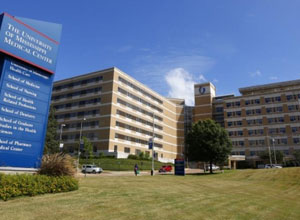 History
History
The University of Mississippi Medical Center (UMMC) is the state's only academic health science center. The Medical Center was established in 1955. UMMC includes six health science schools: medicine, nursing, dentistry, health related professions, graduate studies and pharmacy.
Vital to its education and research missions, UMMC provides wide-ranging patient care programs. Three specialized hospitals on the Jackson campus include the only children's hospital in Mississippi, a women and infants' hospital, and a critical care hospital, along with the University Hospital. UMMC offers the only Level 1 trauma center, the only Level 4 neonatal intensive care nursery, and the only organ transplant programs in the state.
CCTS Partnership
The UMMC participates in the Executive Council, pilots and panels, the Informatics collaborator, the Biostatistics collaborator, and the TissueHub. Their current research projects include transplant outcomes. As part of the CCTS Training Academy, they participate in the TL1 and KL2 training programs, panels, K writing club, research team training, TIERS, workshops and offer mini-sabbaticals.
UMMC operates the Jackson Heart Study (JHS), a multifaceted project sponsored by the National Heart, Lung, and Blood Institute and the National Center for Minority Health and Health Disparities. Developed in response to the now widely appreciated disparity in cardiovascular health between African Americans and the rest of the nation's population, JHS involves three Jackson institutions of higher learning: UMMC, Jackson State University, and Tougaloo College along with collaborators from other academic institutions including UAB. The Jackson Heart Study is the largest, most comprehensive population-based epidemiological study of CVD among African Americans ever undertaken. The overall JHS cohort of 5,300 participants includes a nested family cohort of 1,499 members of 291 families. DNA of each participant in the family cohort has been genotyped for a set of ~400 microsatellite markers (Marshfield marker set 16), and all consenting participants (n=3,443) have been genotyped for genome-wide association studies. More than 1,500 samples have now been selected for whole exome sequencing (all coding regions in the genome).
